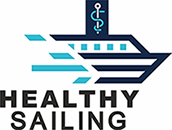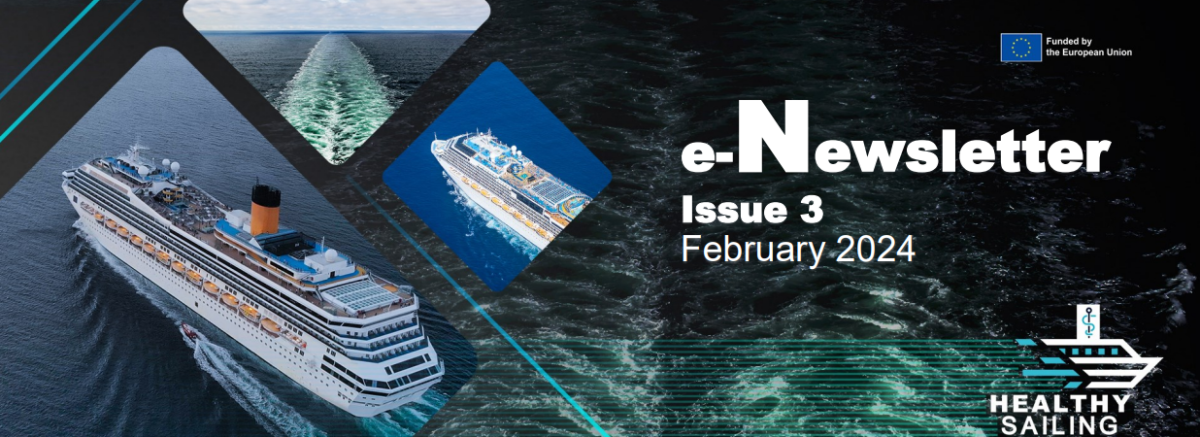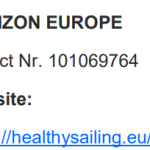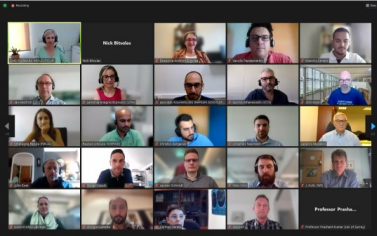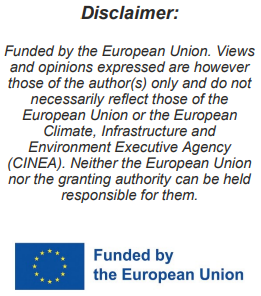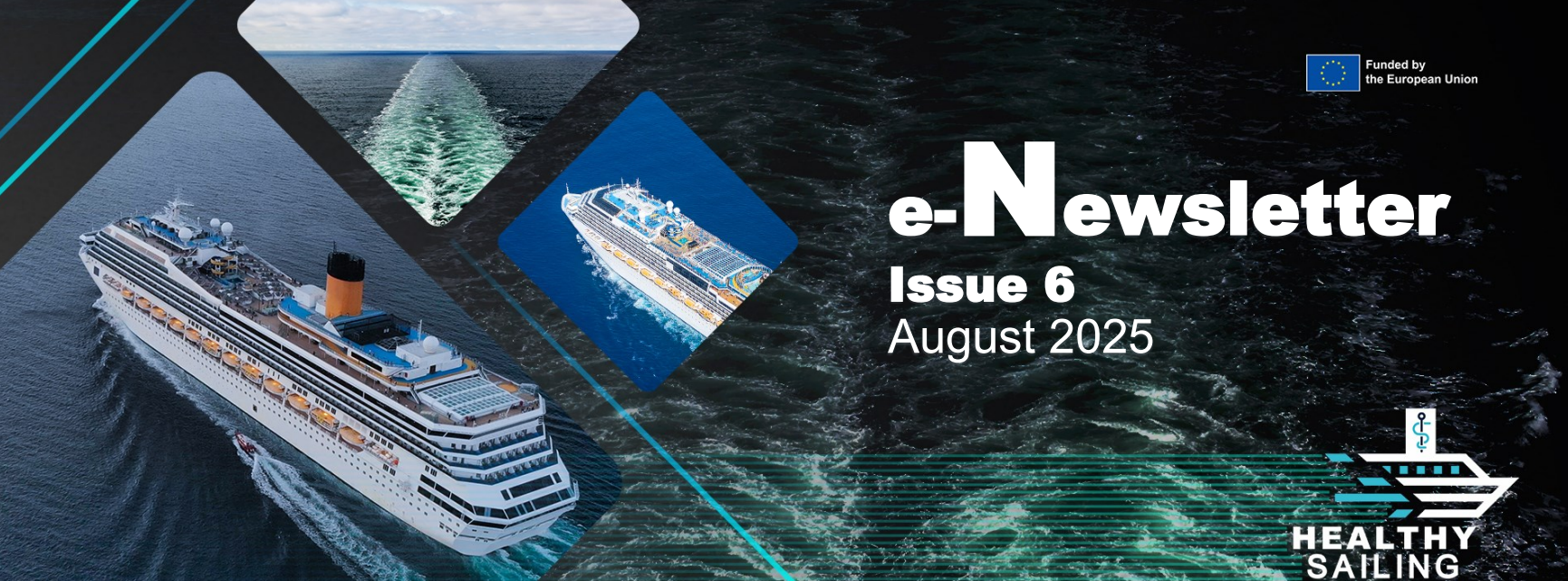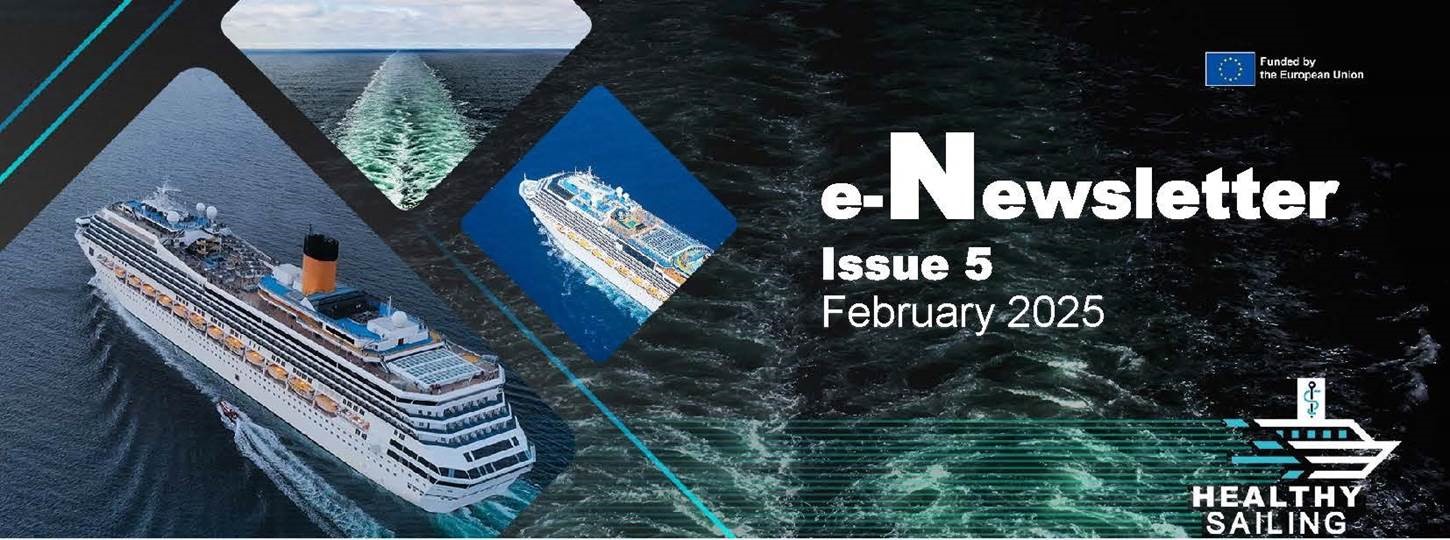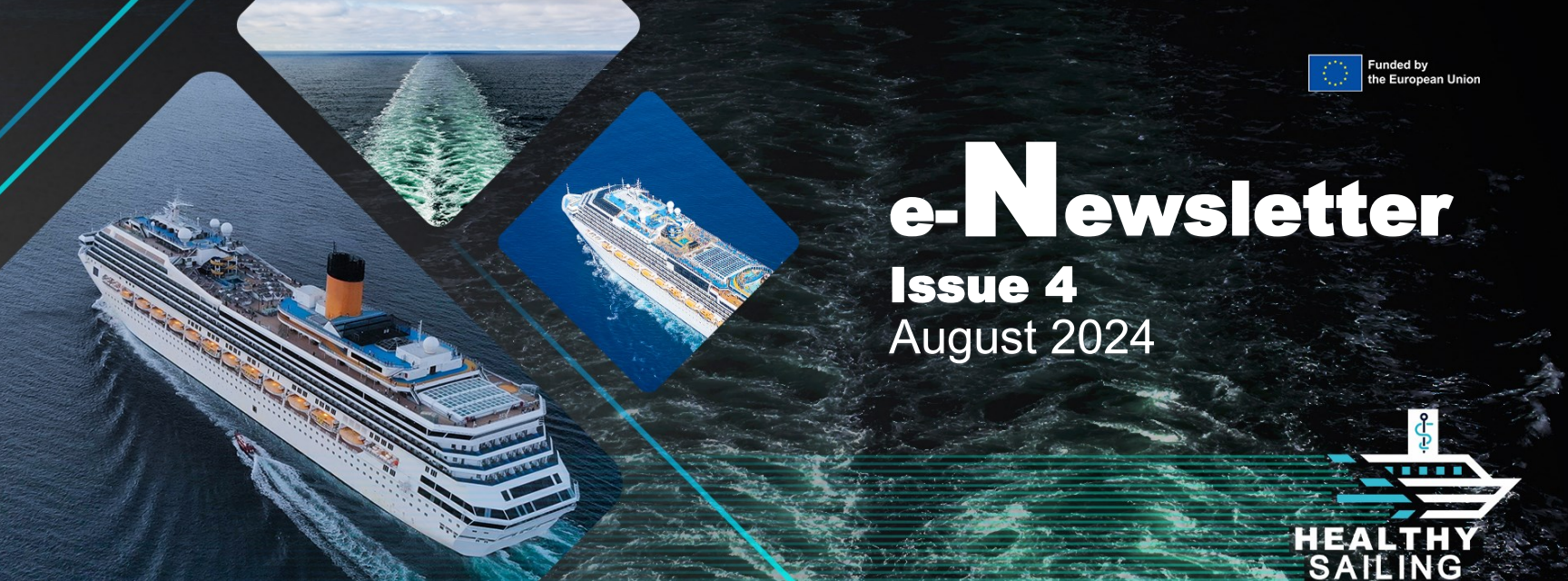HEALTHY SAILING Project Status Update
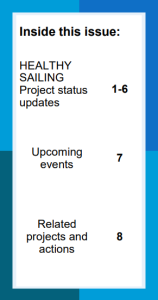
In February 2024 the HEALTHY SAILING project reached a pivotal milestone, as it just crossed 1.5 years of implementation. The initiation phase has been completed and the project is now at the development phase. Here, assessment of proposed prevention, mitigation and management (PMM) measures are undertaken through a range of modelling activities, while their verification is being done through a validation phase, which will include pilot-test studies, technological demonstrations and behavioural change surveys.
Updates from the Coordination
UTH is coordinating currently the inclusion of a round table dedicated at the HEALTHY SAILING project in the programme of the upcoming EU SHIPSAN scientific association congress which will take place on 18-19 October 2024 in Naples, Italy.
Joint Controller Agreement
The Consortium Agreement was updated with a Joint Controller Agreement, to facilitate exchange of personal and epidemiological data between partners.
In addition questionnaires for gender analysis among project consortium were drafted and the results will be used to include provisions related to gender dimension on the project management quality assurance plan. In addition, templates were developed and shared with partners to annually record data processing activities related to HS activities they participate in.
General Assembly Meeting
The 2nd General Assembly Meeting was held online on 20 September 2023 with fourteen out of nineteen representatives from beneficiaries’ organizations.
Work Package leaders presented the project’s progress and all consortium members discussed the short term and long term next steps, also revising
the recommendations derived from the 1st Advisory Board Meeting.
Steering Committee Meetings
The members of the Steering Committee have participated in a total of 5 scheduled meetings and one ad hoc meeting where project progress was discussed and project related decisions were taken. The focus of the latest Steering Committee Meeting conducted on 12th December 2023 was planning for the technical interim report as well as for the European Commission review meeting, in addition to an overview of the project implementation status. The review meeting will focus on presenting to the European Commission project work conducted so far and will be organised in Spring 2024.
NEWSLETTER SUBSCRIPTION
Subscribe to the HEALTHY SAILING eNewsletter: https://healthysailing.eu/category/newsletters/
If you are already subscribed to our newsletter and you would like to unsubscribe, you may do so by clicking here or by sending us an email to the following address: it[at]healthysailing.eu
Follow us on Social Media:
LinkedIn
Twitter
Facebook
YouTube
ResearchGate
Updates from the Coordination 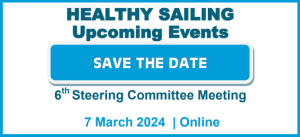
HEALTHY SAILING Ethics Research Committee
The 1st Ethics Research Committee was conducted on 26th October 2023. The HEALTHY SAILING Ethics Research Committee will consider the ethics by design framework for assessing AI related to the project outputs. For HEALTHY SAILING outputs involving AI, HS will explore the option of
carrying out an AI assessment regardless of legal obligation. Future protocols will first be submitted and reviewed by the HS Research Ethics Committee
and then shared with the UTH Research Ethics Board.
HEALTHY SAILING INTERNAL WEBINARS
HEALTHY SAILING consortium members organised from September 2023 until February 2024 a total of 6 internal webinars presenting the work completed and the results of foundation activities. Three more internal webinars are planned for the next year. The webinars have been recorded and are available in the project portal for playback viewing.
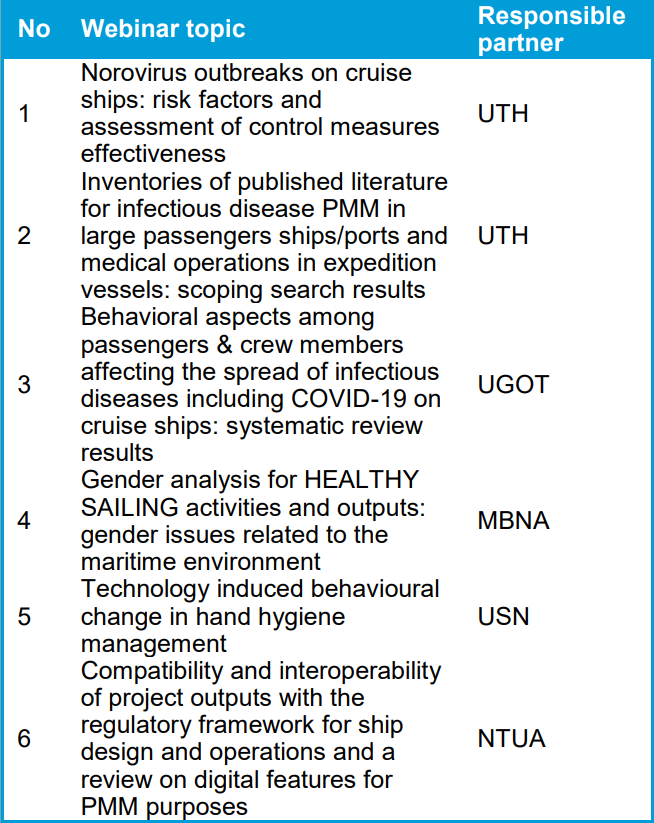
HEALTHY SAILING DELIVERABLES
Until 6 March 2024 a total of 14 out of the 35 deliverables of the HS project have been submitted. See details in the table below.
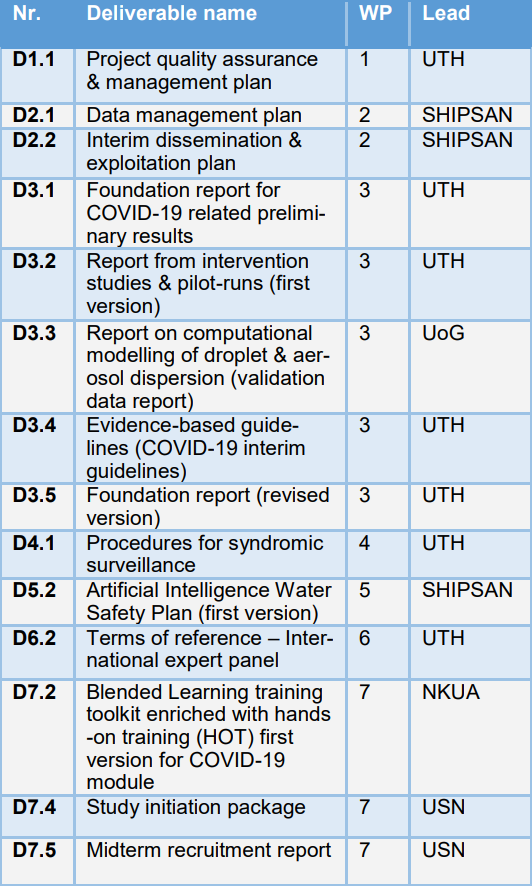
Publications, Dissemination & Communication activities
Article in journal
Behavioural aspects among Cruise Ships Passengers affecting the Spread of Infectious Diseases including COVID-19: A Systematic Review
Sheila Siame, Despoina Andrioti Bygvraa, Delér Shakely, Lynn M Hulse,Varvara Mouchtouri and Christos Hadjichristodoulou for the HEALTHY SAILING project consortium. DOI: 10.19080/OFOAJ.2023.17.555953 https://juniperpublishers.com/ofoaj/
Abstract
Outbreaks of infectious diseases have been reported among tourists on board cruise ships as well as on land-port based premises. Behavioural interventions have been implemented to prevent and mitigate the spread of infectious diseases. This study aimed to identify determinants of behavioural aspects as well as the facilitators and barriers to compliance with preventive measures. A systematic search of literature in Scopus, and Web of Science was conducted. The Joanna Briggs Institute (JBI) checklist, the National Institute of Health (NIH), and the Mixed Methods Appraisal Tool / Checklist (MMAT) were used to appraise the quality of the articles. Four studies with a total of 3103 cruise ship passengers were included. Respondents reported having low knowledge levels (76%) related to preventive measures before COVID-19, with considerable improvement (89.5%) shown in the articles published after the pandemic. Studies examining attitudes and practices reported satisfactory levels. Generally, limited research on cruise ship passengers regarding the three components of Knowledge, Attitudes, and Practices (KAP) exist. The review found that cruise passengers should understand the negative effects of a disease to undertake preventive actions. This should be accompanied with empowerment strategies to motivate individuals to change attitudes. In addition, there is a need to disseminate evidence-based information through responsible and trusted institutions. This survey could help in the designing of relevant prevention, mitigation and control policies for infectious diseases.
HS participated and presented at the following events:
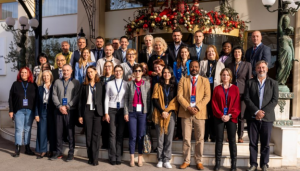 Poster presentation – 23rd International Association of Maritime Universities Conference. Helsinki, Finland,18- 21/10/23: A topic of introducing maritime educational standard for mitigation of infectious diseases spread on large passenger ships.
Poster presentation – 23rd International Association of Maritime Universities Conference. Helsinki, Finland,18- 21/10/23: A topic of introducing maritime educational standard for mitigation of infectious diseases spread on large passenger ships.- 2023 Research Day. School of Public Health in Sweden on 18/10/23.
- International Symposium on Maritime Health: ‘Maritime Medicine-From the Antiquity to Present Day’, 5-8/10/23.
Topics presented:
• Infectious diseases on cruise ships and passengers’ attitudes.
• Healthy Sailing: Prevention, Mitigation and Management of Infectious Disease.
• Infectious diseases on cruise ships and crews’ attitudes. - WHO sub regional workshop on border/boundary health and cross-border/boundary collaboration on 21-23 November 2023 in Thessaloniki, Greece.
Publication in conference proceeding/workshop
WEBSITE AND SOCIAL MEDIA ANALYTICS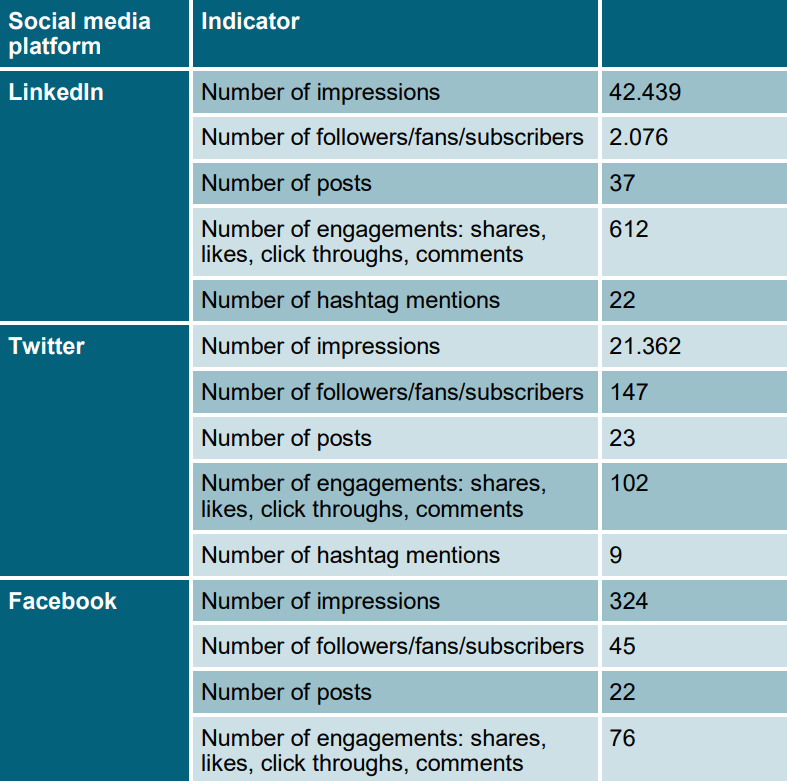
Social media analytics
The numbers of followers, impressions and engagements have increased on the HS social media accounts and followers doubled for LinkedIn. HS remains active on all platforms and from the analytics, it is evident that LinkedIn is the preferred media channel of HS stakeholders to stay up to date with the project’s news (See Figure 1 and Table 1).
Website analytics
Since the launch of the HS website in November 2022, 3,367 page views and 1,285 visits have been recorded.
Document downloads:
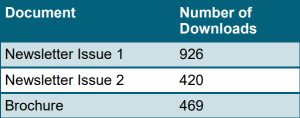

Have you visited the scoping search inventory on the HS website?
If not click here to visit the scoping search inventory.
Under the framework of HEALTHY SAILING Task 3.2.1 (Foundation Report), a scoping review was conducted in February 2023 searching PubMed and Scopus databases, as well as grey literature (World Health Organization, European Centre for Disease Prevention and Control, international organizations, industry associations and EU/EEA Member State public health/maritime transport agencies). The aim of the search was to produce an inventory of published documents related to mechanisms facilitating infection spread on board large passenger ships, and to better understand the effectiveness of prevention, mitigation and management measures implemented. Results of this scoping search have been collated into two searchable inventories, as a resource to support development of future HEALTHY SAILING deliverables.
Establishing a framework for an international committee
(Task Number: 6.3)
Both before and during the COVID-19 pandemic, the maritime transport industry faced challenges highlighting the need for coordinated preparedness and response practices worldwide, as passenger ships continuously sail between countries. The pandemic revealed the necessity for international collaboration to rapidly and effectively manage both routine and extraordinary public health events on large passenger ships. To address this, HEALTHY SAILING is establishing an International Scientific Panel (ISP) for Infectious Diseases related to Passenger Ships, which will provide strategic perspectives complementing the project’s scientific expertise. Specific objectives of the panel include:
– Establishing a forum of experts to exchange lessons learned and best practices for prevention, mitigation and management of infectious diseases on passenger ships;
– Discussing and recommending methods of collaboration worldwide, providing consultation
for the management of major public health events on large passenger ships;
– Contributing to evidence-based decision making for management of public health events, through knowledge and expertise;
– Harmonizing practices to facilitate proportionate public health response
measures by relevant governmental authorities/transport operators during routine operations and major public health events on passenger ships.
Terms of Reference defining the ISP’s scope, membership and working methodology have been developed. Existing institutions, committees and programmes related to passenger ships have been reviewed to identify experts for participation in the panel, considering the broadest possible geographic representation and field of expertise. The first meeting of the ISP is planned for spring/ summer 2024.
Technology induced behavioural change in hand hygiene management
(Task Number: 7.1 )
We are excited to share with you the latest updates from our intervention study conducted onboard Celestyal Olympia between June and November 2023, by the University of South-Eastern Norway (USN). During this period, we conducted a comprehensive study comparing the effectiveness of various infection control measures. To enhance surface safety, we applied long-lasting surface-treatment antimicrobial sprays. Additionally, we introduced technology-induced behavioral changes by installing a hand hygiene monitoring device accessible to both passengers and crew members. To further reinforce proper hand hygiene practices, over 300 crew members participated in dedicated
hand hygiene training sessions. Passengers were informed about hand hygiene through a pillow letter. The impact of these interventions was meticulously assessed through continuous monitoring of hand hygiene compliance and microbial load on various surfaces. The study aimed to find the most effective way to improve the overall safety and well-being of everyone on board.
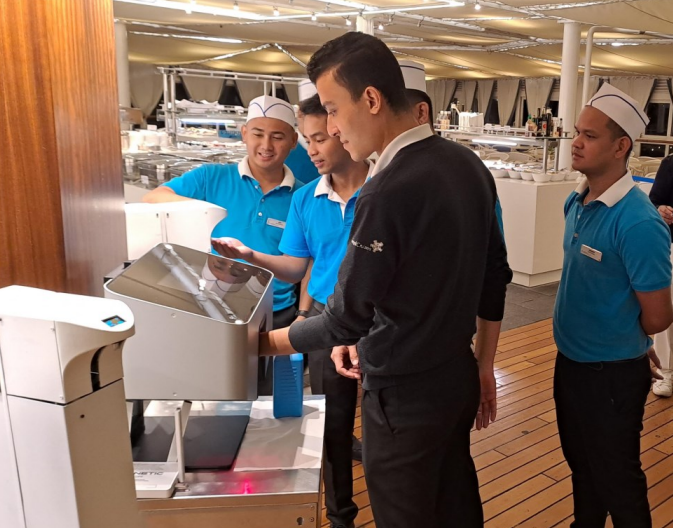
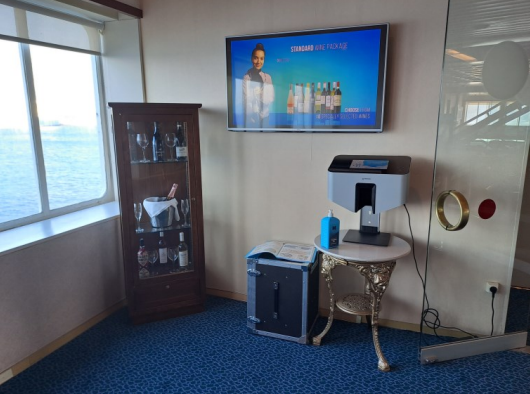
Evidence based guidelines from HS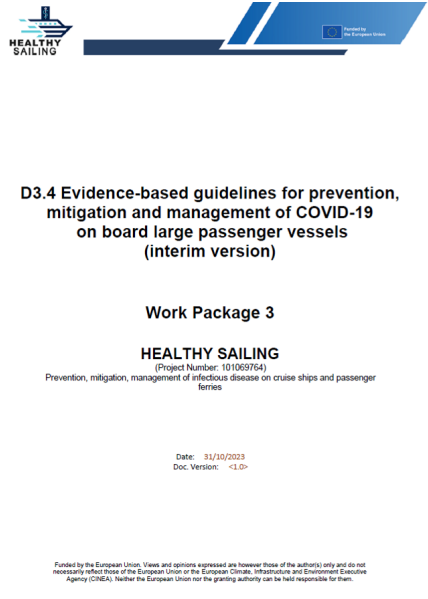
(Task 3.7)
To support operational activities the consortium developed the Interim version of evidence-based guidelines for prevention, mitigation and management of COVID-19 on board large passenger vessels. The purpose of the guidelines is to reduce the incidence of COVID-19 on board passenger ships, to provide information to passenger ships and port health authorities for the proper prevention, mitigation and management of COVID-19 cases on board and ashore, and to provide general guidance for public health emergency preparedness. The HEALTHY SAILING project is currently working to define specificities for large passenger ferries, which will be included in the final version of this document.
Computational modelling of droplet and aerosol dispersion in different
ship environments – Recommendations for air quality and ventilation
(Task Number: 3.4)
As part of HEALTHY SAILING Task 3.4 (led by University of Greenwich, with GCARE – University of Surrey and VTT), an extensive experimental trial was conducted on the MSC Virtuosa during a cruise voyage departing Southampton on 12 August 2023 for 12 days. Measures of aerosol and droplet dispersion and CO2 along with thermal comfort parameters were taken under controlled conditions within selected cruise ship locations (Yoga room in a gym and Doctor room in Spa area), using different ventilation scenarios. Experimental data onboard were collected by using aerosol and CO2 sensors lead by the GCARE team, University of Surrey.
The objectives of the experimental trial were:
1) to identify aerosol and CO2 level inside those spaces on the MSC
Virtuosa cruise;
2) finding thermal comfort level inside the spaces; and
3) to build a set of validation data for improving and tuning
computational modelling of infection risk in those spaces.
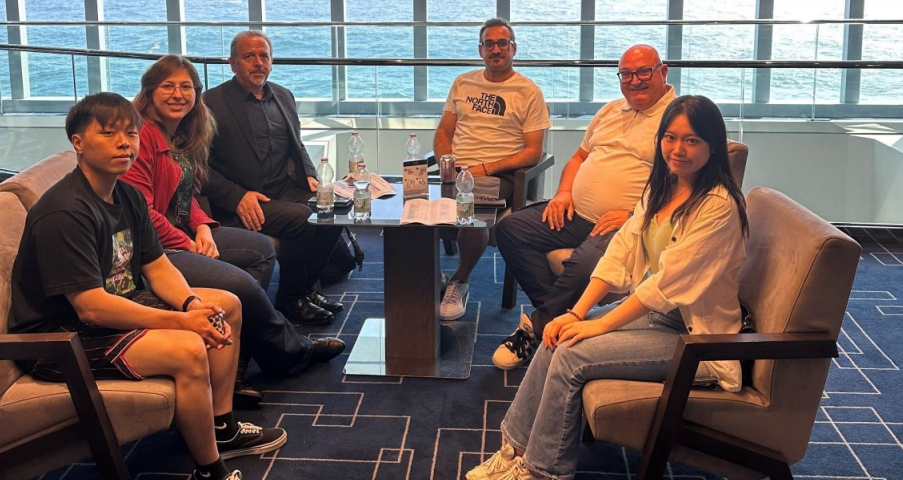
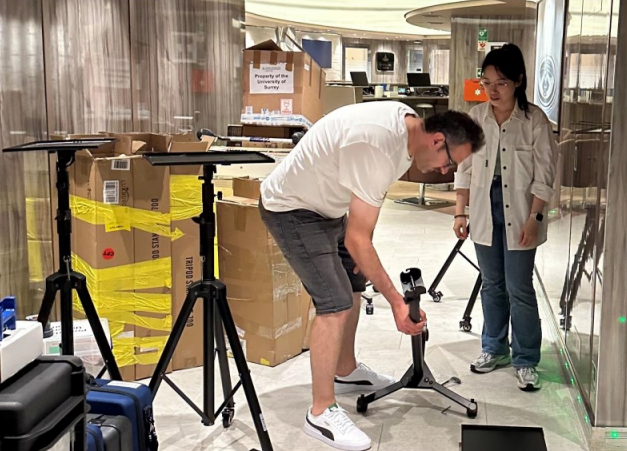
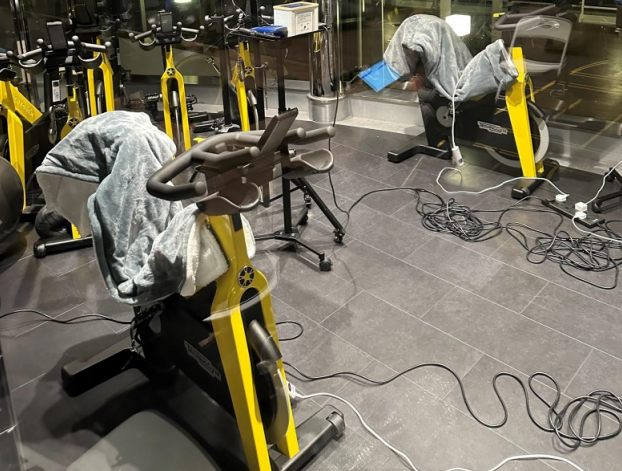
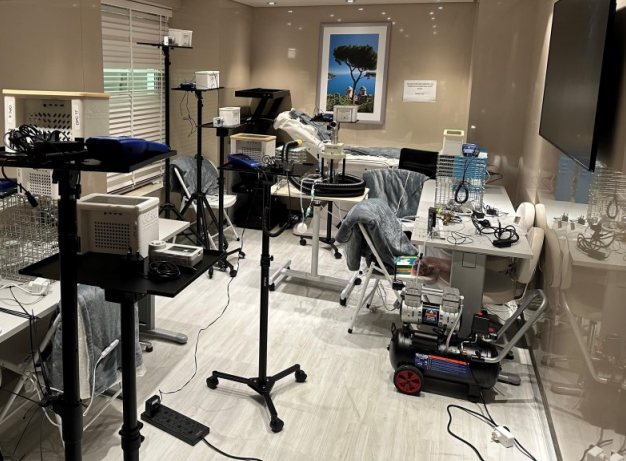
Other Upcoming Events
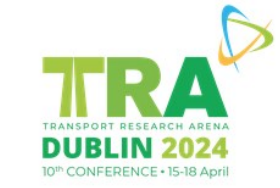 Transport Research Arena (TRA) 10th Conference
Transport Research Arena (TRA) 10th Conference
15-18 April 2024 | Dublin Ireland
The Waterborne Technology Platform (www.waterborne.eu) started the process of preparation of the TRA 2024 in Dublin.
HEALTHY SAILING consortium members will participate and the project will be represented through the following activities:
– “Healthy Sailing: Prevention, Mitigation and Management of Infectious Disease on Cruise Ships and Passenger Ferries”, with an abstract published in the special issue of the journal “European Transport Research Review
– MSC will present specific HS activities they are involved in as part of a TRA booth representing research and innovation actors in the transport field in Switzerland
– A stand at the Waterborne Technology Platform exhibition space.
– Read more here
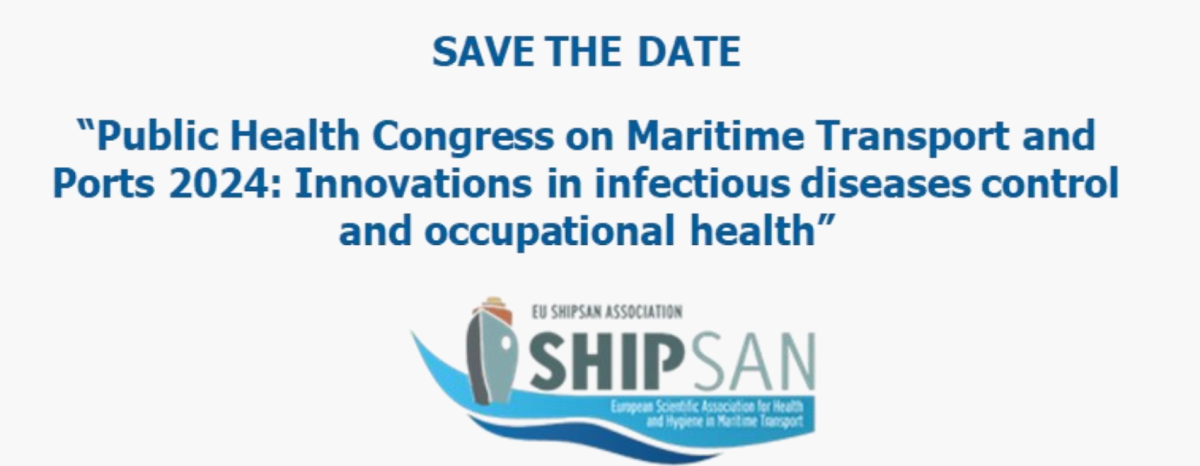
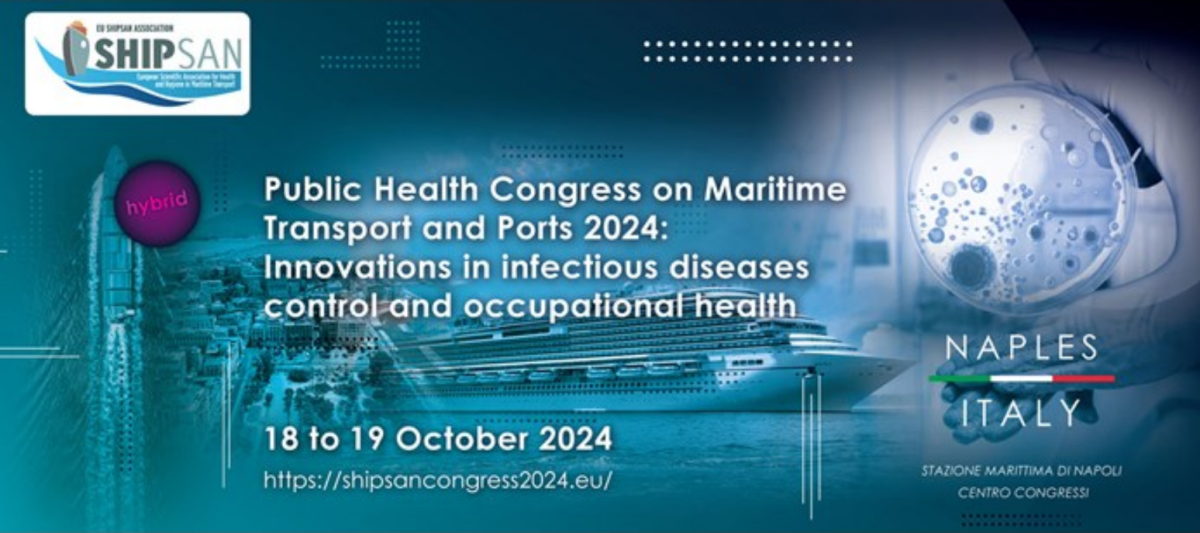
For more information read here
Related projects and actions
Navigating Health at Sea: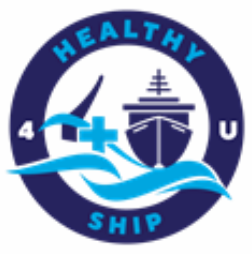
The HS4U continues its journey towards safe and healthy ship design
The Healthy Ship 4 You (HS4U) is a groundbreaking 3-year Horizon Europe project involving a multidisciplinary consortium of 22 partners from 8 different countries. Its objective is to develop and demonstrate holistic ship design solutions aiming to facilitate early detection, prevention, and mitigation of health crises and disease outbreaks in large passenger and cruise ships. With a focus on ensuring healthy ship operations and secure return to port during health emergencies, HS4U is at the forefront of maritime innovation. As the project embarks on its second year, the consortium partners are in the process of finalising the cases/scenarios depicting potential health hazards that may arise on ships. By developing risk assessments and leveraging innovative technologies such as simulation modelling and AI techniques, these scenarios encompass not only the triggers of health crises and their impacts on passengers and crew both when the ship is docked and on route, but they also lay out plans for the prevention, detection and mitigation of these hazards. The identified scenarios will then feed into the Collaborative Digital Framework (CDF), a platform integrating data analytics, co-robotics and AI to enable real-time interaction between passengers, crew, and ship systems with the aim of facilitating swift response planning and execution, thus ensuring the safety and well-being of all on board. Another important component of the project on the horizon is the Viral Detection Sensor (VDS). This groundbreaking technology will provide real-time indication of the location of pathogenic airborne spreads in indoor environments and on the HVAC outlets, facilitating control of actuators and prompt response mechanisms. Additionally, the project partners will set up a virtual demo-space to enable experimentation, pilot deployment and evaluation of the HS4U solutions across different scenarios. Prototypes of the HS4U solutions will then be developed through the creation of a robot-cabin, built-in physical space within a shipping container, allowing for adaptable deployment in diverse settings. HS4U recognises the importance of collaboration and synergies in addressing complex challenges in maritime health and safety. The Consortium is open to partnering with similar projects and initiatives to share knowledge and expertise and ultimately drive meaningful change and innovation in maritime health and safety practices. In the ever evolving landscape of maritime health and safety, HS4U aspires to revolutionise healthy ship design. By fostering an evidence-based approach and creating user-friendly and cutting-edge solutions as well as by developing synergies with similar projects and initiatives, HS4U is paving the way for a healthier, safer future at sea in the post-COVID era.
HS Newsletter Issue 3 – Feb2024 (1826 downloads )